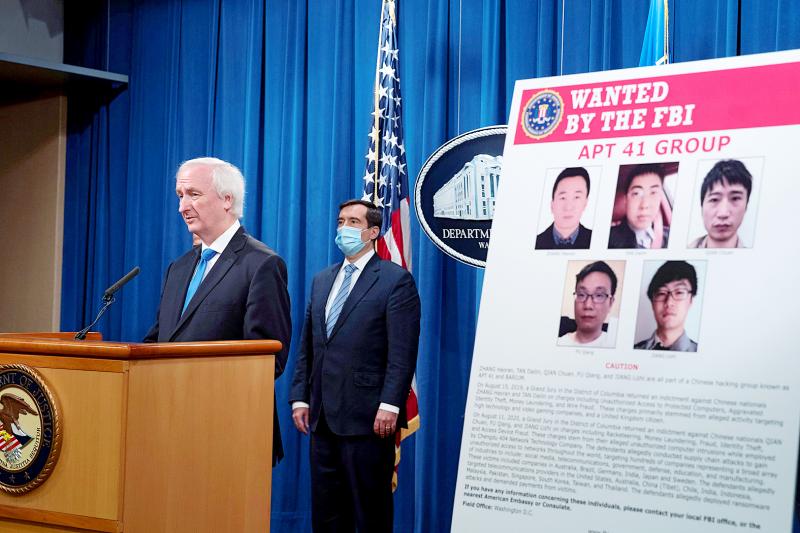The US Department of Justice has charged five Chinese with hacks targeting more than 100 companies and institutions in the US and abroad, including social media and video game companies, as well as universities and telecoms, officials said on Wednesday.
The five defendants remain fugitives, but prosecutors said that two Malaysian businessmen charged with conspiring with the alleged hackers to profit off the attacks on the video game industry were arrested in Malaysia this week and face extradition proceedings.
The indictments are part of a broader effort by the US to call out cybercrimes by China.

Photo: Reuters
US prosecutors in July accused hackers of working with the Chinese government to target companies developing vaccines for COVID-19, and of stealing hundreds of millions of dollars of intellectual property and trade secrets from companies worldwide.
Though those allegations were tailored to the pandemic, the charges announced on Wednesday — and the range of victims identified — were significantly broader, and involved attacks done both for monetary gain as well as more conventional espionage purposes.
In unsealing three related indictments, officials laid out a wide-ranging hacking scheme, targeting a variety of business sectors and academia, carried out by a China-based group known as APT41.
That group has been tracked over the past year by the firm Mandiant Threat Intelligence, which described the hackers as prolific, and successful at blending criminal and espionage operations.
The department did not directly link the hackers to the Chinese government, but officials said that the hackers were probably serving as proxies for Beijing because some of the targets, including pro-democracy activists and students at a university in Taiwan, were in line with government interests and did not appear to be about scoring a profit.
“A hacker for profit is not going to hack a pro-democracy group,” said Acting US Attorney for the District of Columbia Michael Sherwin.
In addition, one of the five defendants told a colleague that he was very close to the Chinese Ministry of State Security and would be protected “unless something very big happens,” US Deputy Attorney General Jeffrey Rosen said.
Rosen criticized the Chinese government for what he said was a failure to disrupt hacking crimes and to hold hackers accountable.
“Ideally, I would be thanking Chinese law enforcement authorities for their cooperation in the matter and the five Chinese hackers would now be in custody awaiting trial,” Rosen said. “Unfortunately, the record of recent years tells us that the Chinese Communist Party has a demonstrated history of choosing a different path, that of making China safe for their own cybercriminals, so long as they help with its goals of stealing intellectual property and stifling freedom.”
In Taipei, the Ministry of Education yesterday said that it was looking into the alleged leak of personal information involving a university.
A university was hacked in October last year and the personal information of 67,000 faculty, students and other employees was stolen, the US indictment said.
A Taiwanese energy company was also the victim of ransomware planted by the hackers on May 4, with malware preventing company officials accessing the system while it targeted a payment system in the retail sector, the indictment said.
Additional reporting by Rachel Lin

The Central Election Commission has amended election and recall regulations to require elected office candidates to provide proof that they have no Chinese citizenship, a Cabinet report said. The commission on Oct. 29 last year revised the Measures for the Permission of Family-based Residence, Long-term Residence and Settlement of People from the Mainland Area in the Taiwan Area (大陸地區人民在台灣地區依親居留長期居留或定居許可辦法), the Executive Yuan said in a report it submitted to the legislature for review. The revision requires Chinese citizens applying for permanent residency to submit notarial documents showing that they have lost their Chinese household record and have renounced — or have never

A magnitude 5.6 earthquake struck off the coast of Yilan County at 12:37pm today, with clear shaking felt across much of northern Taiwan. There were no immediate reports of damage. The epicenter of the quake was 16.9km east-southeast of Yilan County Hall offshore at a depth of 66.8km, Central Weather Administration (CWA) data showed. The maximum intensity registered at a 4 in Yilan County’s Nanao Township (南澳) on Taiwan’s seven-tier scale. Other parts of Yilan, as well as certain areas of Hualien County, Taipei, New Taipei City, Taoyuan, Hsinchu County, Taichung and Miaoli County, recorded intensities of 3. Residents of Yilan County and Taipei received

Taiwan has secured another breakthrough in fruit exports, with jujubes, dragon fruit and lychees approved for shipment to the EU, the Ministry of Agriculture said yesterday. The Animal and Plant Health Inspection Agency on Thursday received formal notification of the approval from the EU, the ministry said, adding that the decision was expected to expand Taiwanese fruit producers’ access to high-end European markets. Taiwan exported 126 tonnes of lychees last year, valued at US$1.48 million, with Japan accounting for 102 tonnes. Other export destinations included New Zealand, Hong Kong, the US and Australia, ministry data showed. Jujube exports totaled 103 tonnes, valued at

BIG SPENDERS: Foreign investors bought the most Taiwan equities since 2005, signaling confidence that an AI boom would continue to benefit chipmakers Taiwan Semiconductor Manufacturing Co’s (TSMC, 台積電) market capitalization swelled to US$2 trillion for the first time following a 4.25 percent rally in its American depositary receipts (ADR) overnight, putting the world’s biggest contract chipmaker sixth on the list of the world’s biggest companies by market capitalization, just behind Amazon.com Inc. The site CompaniesMarketcap.com ranked TSMC ahead of Saudi Aramco and Meta Platforms Inc. The Taiwanese company’s ADRs on Tuesday surged to US$385.75 on the New York Stock Exchange, as strong demand for artificial intelligence (AI) applications led to chip supply constraints and boost revenue growth to record-breaking levels. Each TSMC ADR represents